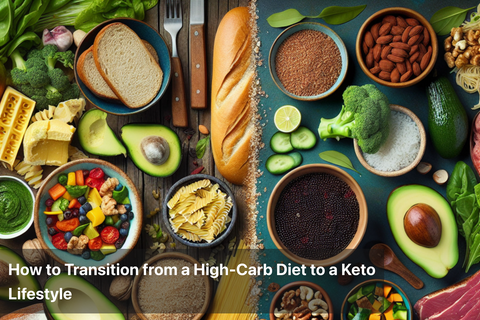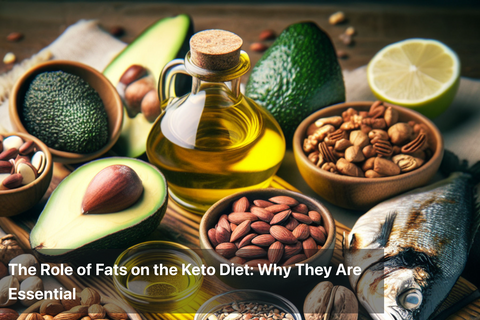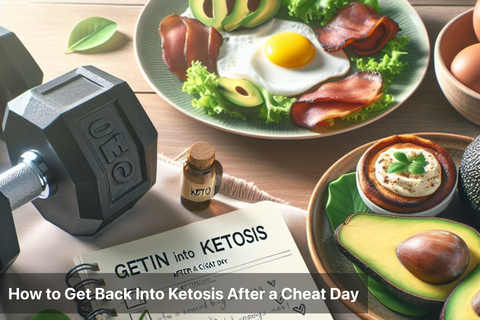
What Are Ketones? Exploring Their Role in the Keto Diet
Ketones are the fundamental energy source in a ketogenic diet, allowing the body to function efficiently when carbohydrate intake is restricted. Instead of relying on glucose, the body shifts to burning fat for fuel, producing ketones in the process. This metabolic shift, known as ketosis, provides various health benefits, including weight loss, stable energy levels, and cognitive enhancement.
Understanding how ketones are produced, their role in metabolism, and their effects on overall health is essential for anyone considering or following a ketogenic lifestyle. These small but powerful molecules fuel the brain, muscles, and organs while supporting fat loss and metabolic efficiency.

What Are Ketones?
Ketones, or ketone bodies, are organic compounds produced in the liver when the body breaks down fat for energy. They act as an alternative fuel source when carbohydrate intake is low or during prolonged fasting.
There are three primary types of ketones:
Beta-Hydroxybutyrate (BHB) – The most abundant and efficient ketone, used as an energy source by the brain and muscles.
Acetoacetate (AcAc) – The first ketone produced during fat metabolism, which can either be converted into BHB or expelled as waste.
Acetone – A byproduct of AcAc, mostly eliminated through breath or urine, responsible for the "keto breath" some individuals experience.
These ketones replace glucose as the primary energy source, making them essential for those following a ketogenic diet.
How the Body Produces Ketones
Ketone production, known as ketogenesis, occurs in the liver when carbohydrate intake is significantly reduced. The process follows these key steps:
Low Carbohydrate Intake – Glucose levels drop, prompting the body to find an alternative energy source.
Fat Breakdown (Lipolysis) – Stored fat is broken down into fatty acids, which travel to the liver.
Ketogenesis in the Liver – The liver converts fatty acids into ketones, which are released into the bloodstream and transported to cells for energy.
Utilization by the Body – Muscles, organs, and the brain use ketones as fuel, reducing dependence on glucose.
This fat-burning process is the foundation of the ketogenic diet and is key to its effectiveness in weight loss and metabolic health.
The Role of Ketones in the Keto Diet
1. Efficient Energy Production
Ketones serve as a stable, long-lasting energy source. Unlike glucose, which causes spikes and crashes in blood sugar, ketones provide consistent fuel to the body and brain.
2. Fat Loss and Metabolism
By shifting the body into ketosis, ketones enhance fat oxidation. Studies show that ketogenic diets help individuals lose more fat compared to low-fat diets, even when consuming the same number of calories.
3. Improved Cognitive Function
Ketones are a preferred energy source for the brain. Research indicates that they reduce inflammation, enhance memory, and support neuroprotection, making keto beneficial for conditions like Alzheimer’s and epilepsy.
4. Blood Sugar and Insulin Regulation
Since ketones do not require insulin for transport into cells, they stabilize blood sugar levels. This makes keto effective for managing type 2 diabetes and insulin resistance.
5. Physical Endurance and Performance
Athletes following a ketogenic diet often experience better endurance because ketones provide sustained energy without the glycogen depletion that occurs in carbohydrate-based diets.
Ketones vs. Glucose: Which Is a Better Fuel?
Feature |
Ketones |
Glucose |
|---|---|---|
Energy Efficiency |
Provides sustained, clean energy |
Causes energy spikes and crashes |
Fat Burning |
Enhances fat oxidation and weight loss |
Promotes fat storage if not burned off |
Brain Function |
Supports mental clarity, focus, and neuroprotection |
Can lead to brain fog and energy fluctuations |
Insulin Response |
Does not require insulin for energy production |
Requires insulin, affecting blood sugar levels |
Performance |
Ideal for endurance sports and prolonged activity |
Best for high-intensity, short-duration workouts |
How to Increase Ketone Levels
For the body to effectively produce and use ketones, specific dietary and lifestyle changes are necessary:
Reduce Carbohydrates – Keep daily intake below 50 grams to trigger ketosis.
Increase Healthy Fats – Avocados, olive oil, coconut oil, and nuts support ketone production.
Practice Intermittent Fasting – Fasting accelerates glycogen depletion and boosts ketogenesis.
Stay Hydrated – Water and electrolytes (sodium, potassium, magnesium) prevent keto flu.
Exercise Regularly – High-intensity training and cardio enhance fat burning and ketone production.
Tracking ketone levels using urine strips, blood meters, or breath analyzers ensures ketosis is maintained.
Common Myths About Ketones and Keto
1. Ketones Are Dangerous
Some confuse ketosis with ketoacidosis, a dangerous condition seen in uncontrolled diabetes. Unlike ketoacidosis, nutritional ketosis keeps ketone levels in a safe, regulated range.
2. Ketones Cause Muscle Loss
Ketones have a muscle-preserving effect by preventing excessive protein breakdown. Studies confirm that adequate protein intake on keto helps maintain lean muscle.

3. You Need Carbs for Brain Function
The brain thrives on ketones and actually functions better on a fat-based fuel source. Keto improves mental clarity, memory, and focus.
Summary
Ketones are essential to the ketogenic diet, acting as a clean, efficient energy source that replaces glucose. Their production leads to fat loss, enhanced brain function, stable blood sugar, and improved endurance. Unlike glucose, ketones provide sustained fuel without crashes, making them an ideal metabolic alternative.
By reducing carbs, increasing healthy fats, and maintaining proper hydration, ketone levels can be optimized for better health and performance. Whether for weight loss, diabetes management, or cognitive enhancement, ketones play a key role in transforming metabolic health.
This Blog post is an initiative by Lo! Foods, to provide accurate and Nutritionist / Doctor approved information related to Health. Lo! Foods is India's leading brand for Everyday Functional Foods. Foods designed for specific Health conditions or Needs. Lo! Foods also runs India's largest range of Low Carb Healthy Cloud Kitchens, under the brand names of Lo!, ProteinChef, ATH (All Things Healthy) and DiabeSmart.















Leave a comment
Your email address will not be published.